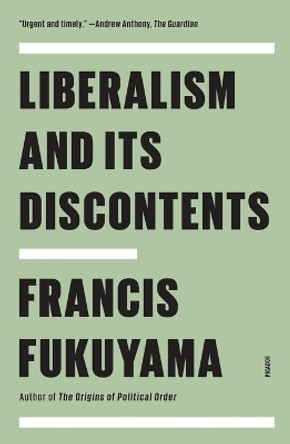Description
How did liberalism, the great political tradition that from the New Deal to the 1960s seemed to dominate American politics, fall from favor so far and so fast? In this history of liberalism since the 1930s, a distinguished historian offers an eloquent account of postwar liberalism, where it came from, where it has gone, and why. The book supplies a crucial chapter in the history of twentieth-century American politics as well as a valuable and clear perspective on the state of our nation's politics today.
Liberalism and Its Discontents moves from a penetrating interpretation of Franklin D. Roosevelt and the New Deal to an analysis of the profound and frequently corrosive economic, social, and cultural changes that have undermined the liberal tradition. The book moves beyond an examination of the internal weaknesses of liberalism and the broad social and economic forces it faced to consider the role of alternative political traditions in liberalism's downfall. What emerges is a picture of a dominant political tradition far less uniform and stable--and far more complex and contested--than has been argued. The author offers as well a masterly assessment of how some of the leading historians of the postwar era explained (or failed to explain) liberalism and other political ideologies in the last half-century. He also makes clear how historical interpretation was itself a reflection of liberal assumptions that began to collapse more quickly and completely than almost any scholar could have imagined a generation ago. As both political history and a critique of that history, Liberalism and Its Discontents, based on extraordinary essays written over the last decade, leads to a new understanding of the shaping of modern America.
Not only are a great many of the individual essays superb--even better, the collection as a whole adds up to a very interesting meditation on modern American liberalism...Brinkley has a rare ability to roam freely between biographical particulars and large generalizations. Several of the pieces show off Brinkley's knack for bringing to life the complexities of a singular character, while others offer an incisive overview of an abstract issue. It is thanks to this rare range of talents that Brinkley is able to shed such interesting light on the problem of twentieth-century liberalism in America: he appreciates the personal and psychological dimensions of political movements, as well as their institutional and economic aspects. -- James Miller The collection is rich and diverse...fresh and insightful...A superb collection of essays. -- William H. Chafe, Duke University
About the Author
Alan Brinkley is Professor of History at Columbia University. His many books include Voices of Protest: Huey Long, Father Coughlin, and the Great Depression, winner of the American Book Award for History, and The End of Reform: New Deal Liberalism in Recession and War.
Reviews
With brilliant economy, Alan Brinkley uses these collected essays to explore where liberalism failed: why Franklin D. Roosevelt condoned racial segregation, why cold-war internationalists gladly rebuilt Europe while ignoring the third world, why the New Left, Old Left and organized labor shunned one another...In his willingness to hear...different voices, Brinkley admirably carries on the liberal tradition. -- Allen D. Boyer * New York Times Book Review *
Liberalism and its fate provide the unifying theme of Brinkley's newest book. A collection of essays, Liberalism and Its Discontents is a Whitman's Sampler of articles, reviews, and pensees put together by one of America's most innovative and insightful historians...Through it all, Brinkley displays a curious and humane mind at work, respectful of liberalism's legacy, mindful of its challenges, and hopeful for its future. -- David M. Shribman * Boston Globe *
Read Brinkley well and you will come away with a fuller sense of the world than from any dozen carping culture warriors taken together...Liberalism and its Discontents collects a full complement of Brinkley's essays from the last 16 years, and, unlike many essayists who open their clipping files to discover that they have enough pages to fill a book, Brinkley/opened his to find he had enough to deserve a book--an entire political history of our time, in fact, beginning (the rise of New Deal liberalism), middle (the New Deal laid siege from all sides in the '60s and '70s) and end (the 90s: may our hero rest in peace)...He is perhaps the most thriving practitioner of his own description of the historian's proper aim, 'reminding our personality-obsessed and result-oriented culture that there are forces shaping our world beyond the actions and characters of individuals--and that we will be more successful if we adjust our expectations and our goals to the reality of those forces, and to the difficulty of understanding them.' -- Rick Perlstein * Washington Post Book World *
For many, perhaps most of the more reflective 19th-century liberals--Constant, Tocqueville, Mill and Weber for example--modernity and liberal values were far from being synonymous. Whether they would finally converge had to be considered an open question. Alan Brinkley's Liberalism and Its Discontents is a subtle, penetrating and refreshingly undoctrinaire exploration of that still open question. In 17 highly readable essays full of lightly worn learning and finely balanced judgements, Brinkley does much to correct the historical myth--presently a central element in America's celebratory national self-image--that the public culture of the United States has been hegemonically liberal throughout most of this century. -- John Gray * Times Higher Education Supplement *
In Europe liberals find themselves competing for power and influence with social democrats who have effectively stolen their thunder. In America, the situation is more complex--and Alan Brinkley's book is an excellent guide to these perplexities...Brinkley's key message is that liberals are baffled because they have misread their own history. They never enjoyed the ideological hegemony they supposed...Liberalism won't begin to be credible, even to respect itself again, unless it respects its enemies, unless it sees itself for what it always was, not a bland managerial consensus, but a fighting creed. -- Michael Ignatieff * London Review of Books *
[Brinkley's] essays over the past fifteen years, collected in Liberalism and its Discontents, are learned, calm and artful. Brinkley betrays real indignation throughout--as any unashamed liberal faced with the task of explaining the last 65 years of American history must--but his is a quiet anger...Brinkley [is] one of the most trenchant, fair-minded and illuminating historical essayists of his generation, and...this book [is] indispensable to anyone seeking to understand one of the signal political questions of our age: What is New Deal liberalism, and where did it go? -- Rick Perlstein * In These Times *
In this collection of essays exploring the tangled history of twentieth-century American liberalism, Alan Brinkley shows his masterly control of historical analysis and prose...Brinkley demonstrates a fine sensitivity to complexity, ambiguity, and illusion in the history of American politics. -- Howard Brick * Journal of American History *
Not only are a great many of the individual essays superb--even better, the collection as a whole adds up to a very interesting meditation on modern American liberalism...Brinkley has a rare ability to roam freely between biographical particulars and large generalizations. Several of the pieces show off Brinkley's knack for bringing to life the complexities of a singular character, while others offer an incisive overview of an abstract issue. It is thanks to this rare range of talents that Brinkley is able to shed such interesting light on the problem of twentieth-century liberalism in America: he appreciates the personal and psychological dimensions of political movements, as well as their institutional and economic aspects. -- James Miller
[Brinkley] provides a graceful, perceptive analysis of the rise of American conservativism since World War II. These essays represent the work of a prominent American historian in his prime, and each one is a gem. Highly recommended. -- Edward Goedeken * Library Journal *
Both learned and readable, these provocative essays will interest all those who still admit to being left of center. -- Joel Neuberg * Booklist *
The collection is rich and diverse...fresh and insightful...A superb collection of essays. -- William H. Chafe, Duke University
Brinkley's survey--equal parts history, historiography, and political theory, enriched and enlivened by vivid biographical portraits--methodically demolishes whatever illusions anyone may still harbor that twentieth-century "liberalism" was ever a tightly defined system of ideas and practices...This book serves as a model of the ethic to which Brinkley calls his fellow practitioners: to ask difficult questions, to provide context to a broad public hungry to understand the past, and to counter those who would reduce complex events and ideas to sweeping narratives and empty cliches. -- Gregory Sumner * American Historical Review *
Book Information
ISBN 9780674001855
Author Alan Brinkley
Format Paperback
Page Count 384
Imprint Harvard University Press
Publisher Harvard University Press
Weight(grams) 531g
Dimensions(mm) 235mm * 156mm * 25mm






